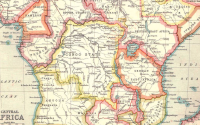13 May 2007Yahoo! News
At least one billion people risk fleeing their homes over the next four decades because of conflicts and natural disasters that will worsen with global warming, a relief agency warned Monday.
In a report, British-based Christian Aid said countries worldwide, especially the poorest, are now facing the greatest forced migration ever -- one that will dwarf those displaced by World War II.
In what at the time amounted to "the largest population displacement in modern history," it said, 66 million people were displaced across Europe by May 1945, in addition to the many millions more in China.
Today there are an estimated 163 million people worldwide who have been displaced by factors like conflict, drought and flooding as well as economic development projects like dams, logging and grain plantations, it said.
"We believe that forced migration is now the most urgent threat facing poor people in the developing world," said John Davison, author of "Human Tide: the real migration crisis."
While the figure is already "staggeringly high," the report warned that "in future, climate change will push it even higher.
"We estimate that over the years between now and 2050, a total of one billion people will be displaced from their homes," the 52-page report said.
The figures include 645 million who will migrate because of development projects, and 250 million because of phenomena linked to global warming like floods, droughts and famine, it said.
It said the conflict in western Sudan's Darfur region, which has displaced more than two million people, was not just driven by political forces but also by competition for increasingly scarce water and land to graze animals.
"Security experts fear that this new migration will fuel existing conflicts and generate new ones in the areas of the world -- the poorest -- where resources are most scarce," said a statement accompanying the report.
"A world of many more Darfurs is the increasingly likely nightmare," it added.
The problem is all the more alarming as those displaced in their own countries have no rights under international law and no official voice, it added.
The report also cited case studies in Colombia, Mali and Myanmar, also known as Burma, as major causes for concern.
With millions having fled a civil war between paramilitary groups and guerrillas in the last 20 years, it said, Colombians are now seeing land taken by paramilitaries-turned businessmen setting up palm oil and other plantations.
In Myanmar, it said ethnic minority groups like the Karen had suffered decades of violence, displacement and persecution only to see the military rulers now use the freed space for dams, logging and palm oil plantations.
Climate change, it said, will drive the growth of grain-producing plantations as rich countries will raise demand for bio-fuels over crude oil in a bid to reduce carbon emissions into the atmosphere.
"In Mali, the threat from climate change is more immediate," it said.
Crop yields have fallen sharply with erratic and declining rainfall levels, forcing farmers to move to feed their families.
Christian Aid, which was created to help refugees from World War II, published the report to mark the 50th door-to-door fundraising in Britain. It hopes to raise 15.5 million pounds (22.72 million euros, 30.7 million dollars).






